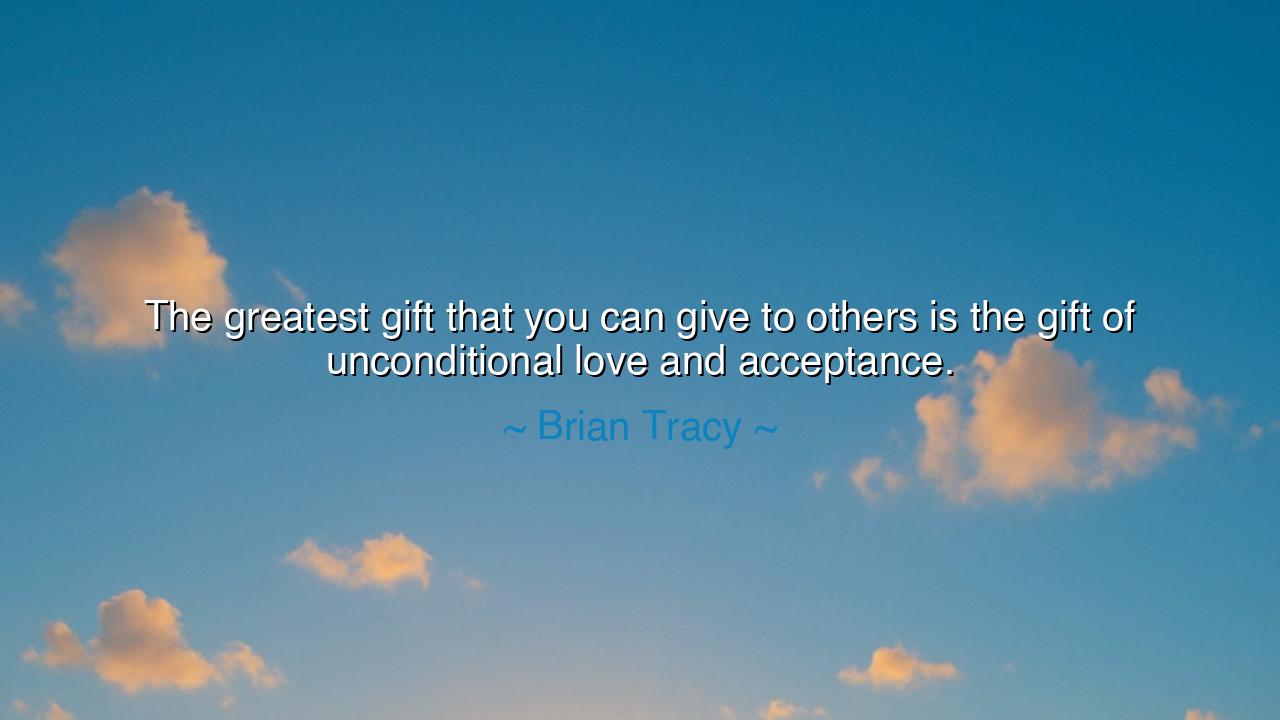
The greatest gift that you can give to others is the gift of
The greatest gift that you can give to others is the gift of unconditional love and acceptance.






Host: The room was quiet, the soft light from the lamp casting a warm glow on the walls. Jack sat near the window, his fingers resting lightly on the edge of his mug, his thoughts clearly somewhere else. Jeeny, across from him, was curled up in her chair, a cup of tea in her hands, but her attention seemed lost in thought. The peaceful atmosphere felt like an invitation to explore a deeper conversation about love, acceptance, and the true meaning of giving.
Host: Brian Tracy’s words filled the room: “The greatest gift that you can give to others is the gift of unconditional love and acceptance.” The simplicity and depth of the statement seemed to open a conversation about what it truly means to offer something meaningful to others, beyond material gifts or actions. Jack, who often focused on the practical and tangible, was the first to respond.
Jack: His voice was thoughtful, almost with a hint of awe: “I love that. We often think of gifts as something tangible, something we give or receive in material form. But what Tracy is talking about is the gift of being there for someone—accepting them as they are, without conditions, without needing them to change or meet certain expectations. That kind of love, the unconditional kind, is rare and precious. It’s one of the most powerful gifts we can give.”
Jeeny: She nodded slowly, her voice gentle, but filled with understanding: “Exactly. Unconditional love and acceptance aren’t about changing someone, or expecting them to live up to a certain ideal. It’s about loving them fully, for who they are, flaws and all. When we offer that kind of love, it creates a safe space for people to be themselves, to grow, and to feel valued. It’s not just about being there for the easy moments—it’s about showing up for the difficult, messy ones too.”
Host: The conversation seemed to deepen, as though Tracy’s words had unlocked something significant about the nature of giving and love. It wasn’t about doing things for others—it was about accepting them in their entirety, with all their imperfections, without needing to change anything. Jack, who often focused on more action-oriented ideas, seemed to reflect on how much true love and acceptance is about presence and authenticity.
Jack: His voice softened, almost reflective, as he continued: “Maybe that’s what makes unconditional love so powerful—it’s not about what you do, but how you make the other person feel. When someone accepts you completely, without expecting anything in return, it gives you the freedom to be yourself. It’s one of the most generous gifts because it’s not dependent on anything—they don’t need to change or meet certain expectations to receive it.”
Jeeny: Her expression deepened, her voice reassuring: “Exactly. It’s about creating a space where the other person can feel fully accepted and loved for who they are. That kind of acceptance doesn’t just help them feel loved—it helps them grow. When we love unconditionally, we give the other person permission to grow into who they are meant to be, without fear of judgment or rejection.”
Host: The room seemed to grow a little quieter, as though their conversation had unlocked something profound about love, acceptance, and the act of truly giving. The realization that the most meaningful gift we can give isn’t something we can hold in our hands—it’s the gift of offering someone space, acceptance, and the freedom to be who they are—felt both freeing and empowering. Jack and Jeeny sat in that quiet understanding that the greatest gift isn’t one that can be wrapped up or bought—it’s the gift of love that expects nothing in return.
Jack: His voice, now softer, seemed almost resolved: “Maybe that’s the real lesson in giving. It’s not about giving something you can touch or hold—it’s about giving acceptance and love without conditions, allowing the other person to truly be who they are. That’s what creates real connection.”
Jeeny: She nodded, her smile full of affirmation, her voice calm and peaceful: “Exactly. It’s about creating an environment where people feel safe, seen, and loved for who they are, not who they’re supposed to be. That kind of love is transformative because it doesn’t just change the other person—it changes you too.”
Host: The evening continued, but the world outside seemed distant now. Inside, Jack and Jeeny sat in the quiet realization that the greatest gift we can offer others is not in the things we give, but in the love and acceptance we show, without conditions. Tracy’s words reminded them that the most meaningful connections come not from expectations or achievements, but from the freedom to love and accept someone for who they truly are.






AAdministratorAdministrator
Welcome, honored guests. Please leave a comment, we will respond soon